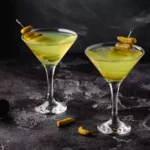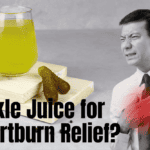Does pickle juice go bad? This is a common question when we find ourselves with an open jar of pickle juice sitting in the refrigerator for an extended period. Whether you’re a fan of pickles or not, you’ve encountered this tangy and briny liquid at some point. While it may seem simple, the answer is more complex than one might think.
In this article, we will delve into the intricacies of pickle juice shelf life, exploring factors that can affect its longevity and providing insights on determining if your pickle juice has gone bad.
What Is Pickle Juice?
Pickle juice is a savory liquid made from the brine of pickled cucumbers. It is often used as a condiment or ingredient in various dishes, such as sandwiches, salads, and soups. The juice is rich in vitamins, minerals, and antioxidants and has been said to have several health benefits, including reducing inflammation and improving digestion.
What Is Pickle Juice Made Of?
Pickle juice is primarily made of water, vinegar, salt, and spices. The water serves as the base for the juice, while vinegar provides a tangy and acidic flavor. Salt is added for taste and acts as a preservative.
Additionally, different spices such as dill, garlic, mustard seeds, and peppercorns are commonly used to enhance the flavor profile of pickle juice. These ingredients work together to create the distinctive taste associated with pickles.
Does Pickle Juice Have An Expiration Date?
No, pickle juice does not have an expiration date. This is because pickle juice is a highly acidic solution that contains vinegar, salt, and other preservatives. These ingredients help to inhibit the growth of bacteria and prevent spoilage.
However, it is essential to note that the quality and taste of pickle juice may deteriorate over time. Exposure to air, light, and heat can cause the flavor to change or become less potent. Therefore, it is recommended to store pickle juice in a cool and dark place to maintain its quality for a more extended period of time.
Does Pickle Juice Go Bad?

Yes, pickle juice can go bad. Like any other food or beverage, pickle juice has a limited shelf life and can spoil over time. The main factors that contribute to the spoilage of pickle juice are exposure to air, temperature fluctuations, and the growth of bacteria or mold. If the pickle juice develops an off smell, unusual color, or a cloudy appearance, it is best to discard it as it may have gone bad. Proper storage in a sealed container in the refrigerator can help prolong the freshness of pickle juice, but it is still recommended to consume it within a reasonable time frame.
Factors Affecting The Shelf Life Of Pickle Juice
Here are the factors affecting the shelf life of pickle juice:
Storage Conditions
The shelf life of pickle juice is affected by the storage conditions. It should be stored in a clean, dry, and cool place, away from direct sunlight and heat sources. The ideal storage temperature is between 40°F and 50°F (4°C and 10°C).
Acidity Level
The acidity level of pickle juice affects its shelf life. Pickle juice with a higher acidity level has a longer shelf life, as the acid is a natural preservative. The ideal pH level for pickle juice is between 4.5 and 5.5.
Sterilization and Sanitation
Proper sterilization and sanitation of the storage containers and equipment are crucial in extending the shelf life of pickle juice. Any contamination or bacterial growth can cause spoilage and affect the juice’s quality.
Oxygen Exposure
Oxygen exposure can cause oxidation and spoilage of pickle juice. It should be stored in airtight containers to minimize oxygen exposure.
Light Exposure
Light exposure can cause the formation of off-flavors and spoilage of pickle juice. It should be stored in a dark place or covered with a lid to minimize light exposure.
Maturation Time
The maturation time of pickle juice can affect its shelf life. Pickle juice matured for a more extended period has a more complex flavor and a longer shelf life.
Type of Pickles
The type of pickles used to make the pickle juice can affect its shelf life. Some pickles, such as dill pickles, have a longer shelf life than others, such as sweet pickles.
Signs Of Spoilage In Pickle Juice

Pickle juice is a brined liquid that can spoil if not stored properly. Here are some signs of spoilage in pickle juice:
Cloudy Appearance
- The pickle juice may become cloudy or hazy, indicating the presence of bacteria or mold.
- Check for any sediment or particles floating in the liquid.
Off Smell
- A sour or unpleasant odor may indicate spoilage.
- If the smell is strong and pungent, it may be a sign of contamination.
Slimy Texture
- If the pickle juice has a slimy texture, it may have gone bad.
- This could be due to the growth of bacteria or mold.
Taste Test
- The best way to confirm spoilage is to taste the pickle juice.
- If it tastes sour, bitter, or unpleasant, it may be spoiled.
Color Change
- Pickle juice can turn brown or grayish-brown if it has gone bad.
- This color change may be due to the oxidation of the liquid.
Proper Storage Methods For Pickle Juice
Here are the proper storage methods for pickle juice:
- Pickle juice should be stored in a sealed container in the refrigerator to prevent spoilage and contamination.
- If you don’t plan to use the pickle juice within a few days, you can freeze it in an airtight container to preserve its freshness.
- Store the pickle juice in a clean glass jar with a tight-fitting lid to prevent contamination.
- Direct sunlight can cause the pickle juice to spoil, so it’s best to store it in a cool, dark place.
- Be sure to label the container with the date and contents to ensure you know what you have and when it was stored.
How Long Does Pickle Juice Last?
Pickle juice, like any other food or beverage, has a limited shelf life. The exact duration of how long pickle juice lasts depends on various factors, such as the storage conditions and whether it has been opened or not. Unopened pickle juice can typically last about 1-2 years when stored in a cool and dark place, away from direct sunlight and heat sources. Once opened, pickle juice should be refrigerated and can last for up to 1-2 months.
Can You Consume Expired Pickle Juice?
No, it is not recommended to consume expired pickle juice. Pickle juice, like any other food or beverage, can spoil over time. Drinking expired pickle juice may lead to foodborne illnesses such as botulism or Salmonella. These illnesses can cause symptoms like nausea, vomiting, diarrhea, and abdominal pain.
It is essential to check the expiration date on the pickle juice bottle and discard it if it has passed the recommended date. If you need more clarification about the safety of consuming pickle juice, it is best to err on caution and avoid consuming it.
Conclusion
In conclusion, pickle juice does have a shelf life, but it can last for quite a long time if stored properly. The high acidity and salt content in pickle juice act as natural preservatives, inhibiting the growth of bacteria and extending its shelf life. However, over time, the quality and flavor of the pickle juice may deteriorate.
It is recommended to consume pickle juice within 1-2 years for optimal taste and quality. Proper storage in a sealed container in the refrigerator will help maintain its freshness for a more extended period. If you notice any signs of spoilage, such as an off smell, mold growth, or changes in color or texture, it is best to discard the pickle juice.
FAQs
How Do You Know If Pickle Brine Is Bad?
Bad pickle brine can have an off smell, slimy texture, or mold growth. If the brine has an unusual color, taste, or smell, it may be spoiled. Check the expiration date on the container and discard the brine if it is past it.
Can You Use Old Pickle Juice?
It is not recommended to use old pickle juice, as it can spoil and potentially be harmful to consume. If the pickle juice has been appropriately stored in the refrigerator, it can last up to 7 days.
How Long Does Pickle Brine Last In The Fridge?
Pickle brine can last for up to 7 days in the refrigerator if it is appropriately stored in a sealed container. It’s essential to keep the brine away from direct sunlight and heat sources.
Can Bacteria Live In Pickle Juice?
Yes, bacteria can live in pickle juice, especially if it is not stored correctly. Improperly stored pickle juice can become a breeding ground for harmful bacteria, such as E. coli and Salmonella.
How To Dispose Of Bad Pickle Juice?
Bad pickle juice should be disposed of in the trash, not down the drain. If the juice is still in its original container, be sure to seal the container tightly before disposing of it. If the juice is in a glass or other container, wash it thoroughly before disposing it.
What Can I Do With Old Pickle Juice?
There are several things you can do with old pickle juice, such as using it as a marinade for meat or vegetables or as a base for a homemade salad dressing. You can also use it as a base for a fermented vegetable brine.
Can I Freeze Pickle Juice?
Yes, you can freeze pickle juice to extend its shelf life. Be sure to transfer the juice to an airtight, freezer-safe container or freezer bag before freezing. Frozen pickle juice can last for up to 6 months.
What Happens If I Consume Bad Pickle Juice?
Consuming bad pickle juice can lead to foodborne illness, as it can contain harmful bacteria such as E. coli and Salmonella. Symptoms of foodborne illness can include nausea, vomiting, diarrhea, and abdominal cramps.
Can Pickles Make You Sick?
Yes, pickles can make you sick if not prepared or stored properly. Improperly canned or fermented pickles can contain harmful bacteria, such as Clostridium botulinum, which can cause botulism.


![Does Pickle Juice Help with Nausea? [ Benefits and Side Effects ] Does Pickle Juice Help with Nausea](https://juicerhunter.com/wp-content/uploads/2023/11/Does-Pickle-Juice-Help-with-Nausea-150x150.webp)



